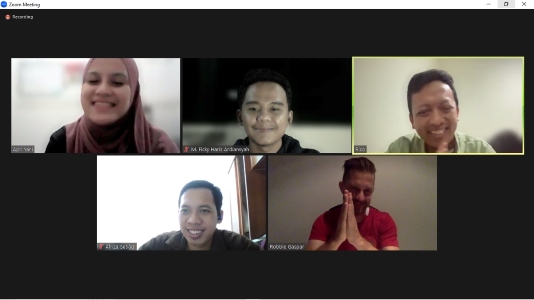IPB University Students and President of Indonesia Institute Discuss Position Paper on Reforming Indonesian Visa to Australia

Two IPB University students, M Ficky Haris Ardiansyah and Apriyani held a discussion with the President of the Indonesia Institute, Robbie Gaspar, a while ago. This discussion was about a position paper on the reform of strengthening Indonesian visas to Australia. The reason is, during this time Indonesian citizens have difficulty traveling to Australia due to obstacles in visa licensing.
Indonesia Institute is a non-governmental organization in Western, Australia that actively promotes Indonesia-Australia relations. The Indonesia Institute has released a position paper on strengthening and reforming Indonesian visas to Australia.
“Indonesians still find it difficult to visit Australia due to visa issues. There are approximately 600,000 Indonesian visas to Australia that have not been issued for more than 12 months even though they have been paid for. This very long visa issuance process has even exceeded the travel departure deadline,” said Robbie.
This problem, he said, resulted in low confidence among Indonesians to visit Australia. This also has a negative impact on the economy due to the decline in tourist visits.
Robbie added, reform efforts to change the requirements and services for Indonesian visas to Australia need to be carried out immediately. Therefore, the Indonesia Institute in its Position Paper proposes several changes. Namely the availability of a money-back guarantee for visa makers who experience delays and create a transparent visa-making system.
“It is also necessary to create technology that can speed up visa applications using Artificial Intelligence. In addition, cheaper visa fees and faster online visa applications for Indonesians with certain criteria,” he suggested. Robbie said he was ready to be involved in supporting this idea for the development of future visa models.
With this opportunity for discussion, Ficky and Apriyani said that they learned a lot about the visa reform that the Indonesia Institute is working on.
Ficky said that he learned how to be good at international diplomacy. One of his favorite pieces of advice was that Indonesia, which has a good relationship with Australia, should support each other, not undermine each other.
“I remember Robbie Gaspar’s message that this is a breakthrough step for better collaboration. Give each other input and offer solutions and assistance,” Ficky concluded. (FHA/Rz) (IAAS/RUM)



